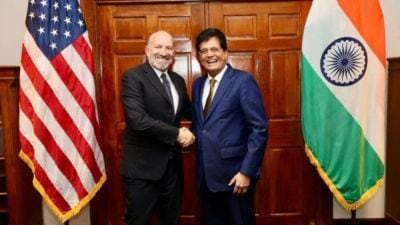When my husband, the astrophysicist, was smitten by a star
Eminent scientist Jayant Narlikar, who has been selected for the Padma Vibhushan, couldn’t attend the awards ceremony in New Delhi on W...

Eminent scientist Jayant Narlikar, who has been selected for the Padma Vibhushan, couldn’t attend the awards ceremony in New Delhi on Wednesday, as he is stationed in Paris. But he did make it a point to be present in Kolkata in May to accept the Raja Ram Mohan Roy award for his work in astrophysics. It so happened that Saurav Ganguly too was an awardee at the function. Mangala J Narlikar writes from Paris on Kolkata, Saurav and Prof Narlikar.
Raja Ram Mohan Roy was a great reformer, scholar and humanitarian. As one who fought against superstition, ridiculous rituals and inhuman social customs such as Sati, we certainly have the highest regard for him. So when Jayant was offered an award for his work in astrophysics, named after Raja Ram Mohan Roy, we were thrilled. Even though we are stationed in Paris up to September, we decided to go to Kolkata for the awards ceremony on May 22, which is the birth anniversary of the great man.
From the airport to our hotel, we saw lots of big posters of Sachin Tendulkar, which spoke of the love of cricket in Kolkata. When I remarked on it, the person who accompanied us said, ‘‘Yes, of course. And our Maharaj will be coming tomorrow, as well.’’ He meant Saurav Ganguly, who was an awardee in the field of sport. There were five awardees in all, the other three being Professor Misra for Mathematics, Professor Bandopadhyaya for Applied Chemistry and Manoranjan Sen for Public Service.
The function, which was to take place at Nazrul Manch, not far from the high school run by the Raja Ram Mohan Trust, was supposed to begin at 10 a.m. We reached the venue just before time and the huge pandal with more than 3,000 persons, half of them students, was animated with enthusiasm. We were taken to a little room reserved for guests. All other awardees except Ganguly were there and he too arrived with wife just after 10 a.m., followed by a bunch of photographers. After a while, the awardees were taken onto the stage and their family members were accommodated in the first row of the audience. Not bad, by Indian standard time.
There was a wide strip of about 20 feet between the stage and the first row and it was teeming with people walking in both directions. Student volunteers were trying to clear the space of kids, in colourful costumes for an entertainment programme, their parents and other people who had not yet been seated. Somehow word got around that though Ganguly was on stage and quite unapproachable, Mrs Ganguly was in the first row and very approachable. Soon, there was a stream of school kids walking up to Mrs G for her autograph.
Poor Mrs G did not know what to do and frantically went on signing. Fortunately, a lady teacher came to her rescue and swept the children away and kept two volunteer girls to ward off autograph-seekers. Soon, the kids were requesting volunteers to procure the autograph for them. Finally, the lady teacher returned and requested Mrs G not to give autographs to anyone. But it stopped only for a few minutes. While Mrs G was being harassed by kids and their parents, the ceremony on stage had begun.
The results of the general elections had recently come out and the Chief Minister, who was supposed to preside, was unable to come due to unexpected urgent work. He had sent a message which was read out respectfully.
Each awardee was introduced, felicitated and asked to make a short speech in reply. Jayant was the first to receive the award and Saurav Ganguly, who was sitting next to him, was the last. By 11.35 a.m., when the thanksgiving speech had started, Saurav slipped out from the stage and his better half from the first row followed him.
As people on the stage began leaving, I got up to join Jayant — the ceremony was over in an hour-and-a-half. When I commented on this, Jayant smiled and told me the inside story. When he was sitting next to Saurav, he expressed his fears of Indian time-keeping. Sourav told him that he had informed the organisers that he could not stay too long and must leave at 11.30 a.m. That had prompted the organisers to keep the time.
‘‘And did you see how poor Mrs Ganguly was harassed for the autograph by the kids?’’ I asked. He nodded and said with a sly smile, ‘‘I too got Sourav Ganguly’s autograph on the programme sheet for Leela (our youngest daughter). Wouldn’t it make her happy and her cricket-mad cousins jealous?’’ I was amused to see the kid in the eyes of the 65-year-old scientist.



- 01
- 02
- 03
- 04
- 05




























